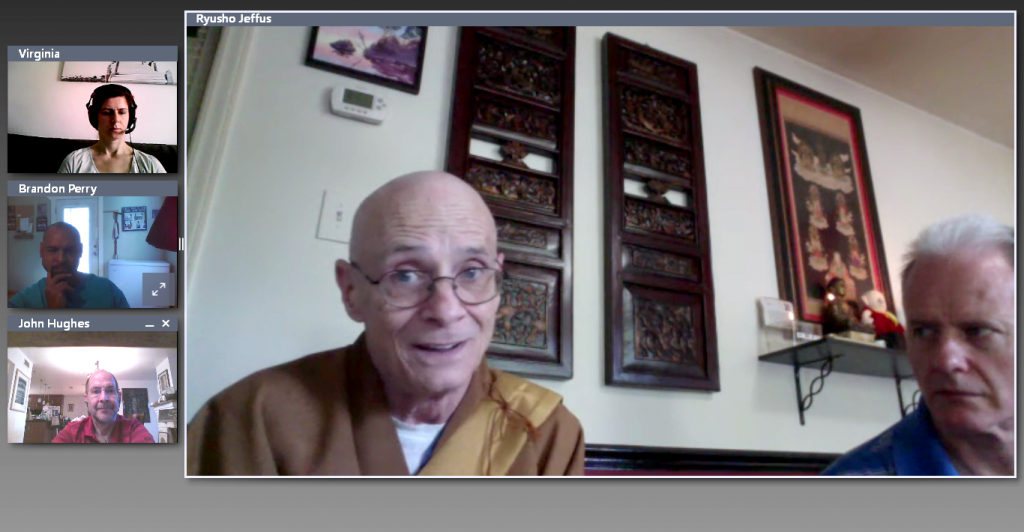Day 6 continues with Chapter III, with the introduction of the Parable of the Burning House.
Thereupon the Buddha said to Śāriputra: “Did I not tell you, ‘The Buddhas, the World-Honored Ones, expound the Dharma with expedients, that is, with various stories of previous lives, with various parables, with various similes, and with various discourses only for the purpose of causing all living beings to attain Anuttara-samyak-saṃbodhi’? All these teachings of the Buddhas are for the purpose of teaching Bodhisattvas. Śāriputra! Now I will explain this with a parable. Those who have wisdom will be able to understand the reason if they hear the following parable.
The ignorance of the children and their willfulness is what strikes me with today’s reading.
[The father] warned them with these good words out of his compassion towards them, but they were too much engrossed in playing to hear the words of their father. They were not frightened or afraid. They did not wish to come out. They did not know what a fire was, what a house was, and what they would lose. They ran about happily. They only glanced at their father occasionally.
And after the father succeeds in enticing the children out of the burning house with promises of toys, they respond like spoiled brats:
They said to their father, ‘Father! Give us the toys! Give us the sheep-carts, deer-carts, and bullock-carts you promised us!’
As a father of a son (and happy I did not have a daughter) I struggled with the real-world dilemma of allowing my son the freedom to explore and grow while attempting to maintain a safety fence around the perimeter of that freedom. My compassion is not as great as the Buddha’s. If my son whined for a reward after nearly dying in flames, I would have withheld that reward.
My spiritual father, the Buddha, is far more compassionate:
I am the father of the world. I eliminated fear, despondency, grief, ignorance and darkness. I obtained immeasurable insight, powers and fearlessness. I have great supernatural powers, the power of wisdom, the pāramitā of expedients, the pāramitā of wisdom, great compassion, and great loving-kindness. I am not tired of seeking good things or of benefiting all living beings. I have appeared in the triple world, which can be likened to the rotten and burning house, in order to save all living beings from the fires of birth, old age, disease, death, grief, sorrow, suffering, lamentation, stupidity, darkness, and the three poisons, to teach all living beings, and to cause them to attain Anuttara-samyak-saṃbodhi. I see that all living beings are burned by the fires of birth, old age, disease, death, grief, sorrow, suffering and lamentation. They undergo various sufferings because they have the five desires and the desire for gain. Because they have attachments and pursuits, they have many sufferings in their present existence, and will suffer in hell or in the world of animals or in the world of hungry spirits in their future lives. Even when they are reborn in heaven or in the world of humans, they will still have many sufferings such as poverty or parting from their beloved ones or meeting with those whom they hate. Notwithstanding all this, however, they are playing joyfully. They are not conscious of the sufferings. They are not frightened at the sufferings or afraid of them. They do not dislike them or try to get rid of them. They are running about this burning house of the triple world, and do not mind even when they undergo great sufferings.[’]
“Śāriputra! Seeing all this, I [also] thought, ‘I am the father of all living beings. I will eliminate their sufferings, give them the pleasure of the immeasurable wisdom of the Buddha, and cause them to enjoy it.’
“Śāriputra! I also thought, ‘If I extol my insight, powers, and fearlessness in the presence of those living beings only by my supernatural powers and by the power of my wisdom, that is to say, without any expedient, they will not be saved because they have not yet been saved from birth, old age, disease, death, grief, sorrow, suffering and lamentation, but are burning up in the burning house of the triple world. How can they understand the wisdom of the Buddha?’
“Śāriputra! The rich man did not save his children by his muscular power although he was strong enough. He saved them from the burning house with a skilful expedient and later gave them each a large cart of treasures. “In the same manner, I save all living beings from the burning house of the triple world, not by my powers or fearlessness, but with a skillful expedient.”


